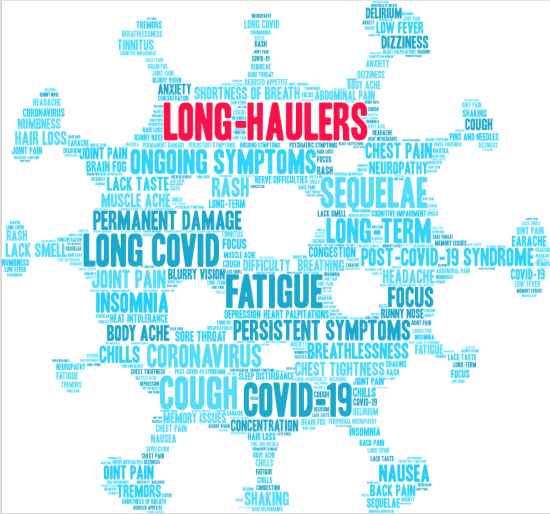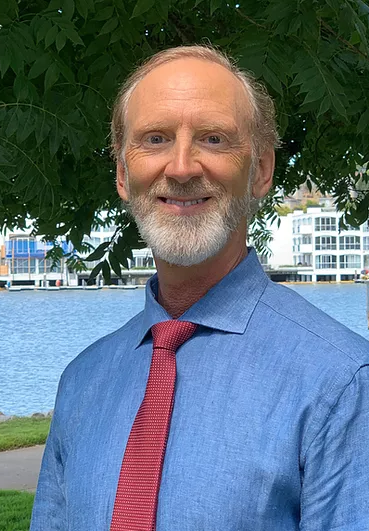
The term “Post-Covid Syndrome,” broadly relates to people of all ages who have had a recent documented Covid-19 infection, subsequently tested negative either once or multiple times, yet still have persistent symptoms including fatigue, brain fog, gastrointestinal symptoms, headaches, dyspnea, muscle aches, chest pain, reduced exercise tolerance and heart palpitations.
These symptoms persist long after recovery from the initial infection and may last for months.
Post-Covid syndrome, also known as “Long Covid” or “Longhauler syndrome,” is not always dependent on the presence of comorbidities or on the severity of the initial Covid-19 infection. In fact, some patients report a mild initial infection, followed by what appears to be recovery, only to be followed weeks or months later by the onset of severe fatigue as well as multiple additional symptoms.
The prevalence of post-acute sequelae of SARS-CoV2 infection (PASC), a term coined by Dr. Anthony Fauci, is believed to be between 15-30%.
While many of these “long Covid” patients may have similar and overlapping symptoms, we should not assume that all cases are due to the same etiology. A symptom such as ongoing dyspnea may be due to direct tissue damage by the SARS-CoV2 virus while arthralgias and myalgias may be due to a persistent inflammatory response.
We need to tailor our diagnostic testing appropriately, based on each patient’s individual presentation and symptoms.

Some researchers believe that symptoms such as cognitive dysfunction and attention deficit may occur because the virus attacks the endothelial lining of blood vessels in the brain causing minute, undetectable hemorrhages and microthrombi. There’s some data to support that view.
A recent meta-analysis of Covid-19 post-mortem brain dissections identified focal microhemorrhages in 16%, intravascular microthrombi in 8% and moderate to intense microglial activation, indicative of increased inflammation, in 50% of post-Covid brains (Shibani S, et al. Neuroscience Letters, 2021).
Mitochondrial Damage
Mitochondrial dysfunction may also play a role in post-Covid syndrome. If a patient’s cells are not well-nourished, or if they have not inherited a robust mitochondrial genome compatible with their nuclear genome, they may not have the energy reserves necessary to repair the free radical damage caused by a significant viral infection such as SARS-CoV2.
Miller and colleagues recently reported that across multiple tissue types, SARS-CoV2 reduced the expression of nuclear-encoded mitochondrial genes related to cellular respiration, particularly involving Complex I activity (Miller B, et al. Sci Rep. 2021).
Complex I, the first enzyme in the mitochondrial electron transport chain, is known to be a “choke-point” in cellular energy production. Reduced activity of Complex I leads to “electron leak” and decreased mitochondrial resilience.
Post-Covid syndrome is not always dependent on the presence of comorbidities or on the severity of the initial Covid-19 infection. Some patients report a mild initial infection, followed by what appears to be recovery, only to be followed weeks or months later by the onset of severe fatigue as well as multiple additional symptoms.
The mitochondria inside platelets may also be affected by this free radical-fueled apoptotic process. When oxidative phosphorylation within the platelet mitochondria is impaired, and sufficient ATP is unavailable, platelet dysfunction can lead to microhemorrhages and microinfarcts (Saleh J, et al. Mitochondrion, 2020).
Apoptotic platelets may induce clotting at a 50-fold greater rate than normal platelets.
In my three decades of treating patients with acute and chronic viral infections, as well as post-viral symptoms, I have found that supporting healthy mitochondrial function is a fundamental component to restoring good health.
My clinical and research experience has identified several key mitochondrial nutrients that, when combined, yield synergistic and clinically significant benefits. These include:
- Acetyl-L-carnitine (500-1,000mg/day)
- N-acetyl-cysteine (600-1,200mg/day)
- Alpha lipoic acid (200-400mg/day)
- Coenzyme Q-10 (100-200mg/day)
These nutrients are even more effective when administered with therapeutic dosages of key cofactors including B-vitamins (30-60mg/day), vitamin C (1,000-2,000mg/day), magnesium (100-200mg/day), zinc (15-30mg/day) and selenium (100-200 mcg/day).
Across multiple tissue types, SARS-CoV2 reduced the expression of nuclear-encoded mitochondrial genes related to cellular respiration.
The aforementioned micronutrient formula is available as K-PAX MitoNutrients from Integrative Therapeutics. I recommend that patients with post-viral syndrome take between 4-8 tablets per day as the foundation of their program. Several other companies also offer nutrient combinations for mitochondrial support.
Host Susceptibility
Why do some people who are infected with SARS-CoV2 become seriously ill while other have only mild disease or remain entirely asymptomatic? As recently described in Holistic Primary Care by Dr. Russell Jaffe, the concept of ‘host hospitality’ is a simple way of looking at this important question.
A susceptible host is one in whom conditions are favorable for a pathogen like SARS-CoV2 to not only infect, but to thrive. While many factors can affect how and why an individual becomes infected in the first place, a deficit of essential nutrients, adrenal insufficiency, and/or previous exposure to environmental toxins predispose people to the hyper-immune responses that can lead to serious illness.
Persistent symptoms including fatigue, brain fog, gastrointestinal symptoms, headaches, dyspnea, muscle aches, chest pain, reduced exercise tolerance and heart palpitations.
When I dig deeply into the histories of people with post-viral syndrome, there is often evidence of not eating properly, not sleeping well, chronic stress, and long periods over-extending themselves. These patients usually have no idea that their health was becoming progressively out of balance.

I call this the “House of Cards” scenario.
This is basically a depleted state that has gradually evolved over years. Contributing factors include age-related mitochondrial dysfunction, adrenal insufficiency, an unhealthy gut microbiome, and/or an immune system that has been subject to multiple previous infections or antibiotic treatments.
These factors all promote the loss of immune resilience and increase the potential for a hyper-inflammatory response.
Every long Covid patient I have treated to date has had some level of adrenal insufficiency, as demonstrated by low cortisol levels on salivary hormone testing. I do not know whether this insufficiency preceded the SARS-CoV2 infection or emerged as a result of the long Covid syndrome. But the association is clear.
Comprehensive Treatment
To help individuals with post-viral syndrome return to a normal state of health and functioning we need to simultaneously address multiple imbalances in a systematic fashion, both pharmacologically and non-pharmacologically.
The key components of a post-viral syndrome treatment program include:
1. Mitochondrial support with key micronutrients. Ensuring that the mitochondria are well-supported nutritionally will enable every other aspect of a healing program to work more effectively.
2. Microbiome support guided by comprehensive stool testing. Covid-19 viral particles are frequently found in fecal samples. Further, several gut commensal organisms with known immunomodulatory potential, including bifidobacteria, are under-represented in Covid-19 patient samples. It is important to engage patients in making dietary changes and in the use of supplements aimed at improving microbiome health of their microbiome. Avoidance of unnecessary antibiotics is also key.
3. Adrenal support with micronutrients, botanicals such as Ginseng and Ashwagandha, and hormone replacement. As long as hormone levels are monitored quarterly, I do not hesitate to supplement with cortisol to achieve optimal physiological levels.
4. Deep, restorative sleep is an absolute necessity.
5. Avoidance of excessive stress.
6. Prescription Medications to address specific symptoms such as pain, immune system hyper-reactivity, and sleep problems. By reducing symptom burden, we give the natural therapies time to work.
7. Strategic Pacing – is very important to help conserve energy.
8. Environmental Testing – to rule out the possibility of mold exposure and chemical toxicity that can contribute to a patient’s lack of immune resilience.
Many research centers, including Mount Sinai Health System’s Center for Post-Covid Care in New York City, have recently set up programs to investigate and treat the growing number of patients who remain persistently symptomatic after acute Covid-19 infection.
Functional medicine practitioners who specialize in treating fatigue and post-viral syndrome with a systems-based approach aimed at restoring the body’s integrity and homeostasis can offer these patients a tried and true path to recovery.
The key is to apply the above treatment components simultaneously and in a personalized manner.
For more detailed information on treating post-viral syndrome with an integrative approach, visit: https://www.jonkaiser.com/blog.
Jon D. Kaiser, MD, has been treating individuals with chronic medical conditions for over thirty years with a combination of natural and conventional treatments. Dr. Kaiser also specializes in mitochondrial biology and has published several research studies on the link between mitochondrial dysfunction and chronic diseases. He is on the faculty of the University of California Medical School in San Francisco and is the author of several books on the immune system. www.JonKaiser.com.







